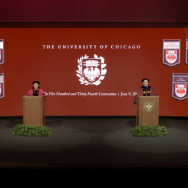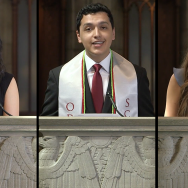This year, more than 3,000 people earned degrees from the University of Chicago—marking the end of one intellectual journey, and the beginning of another.
Their time in Hyde Park was transformative in different ways. Some entered the undergraduate College, and learned more about themselves as they grew into adulthood. Others started families and began careers. A few shook hands with a former president.
These are just a few of their stories.
Building a family during a pandemic
Victor Cedeño immigrated to the United States from the Dominican Republic in 2001, not long after 9/11. As he began his new life in Iowa, 12-year-old Cedeño wondered if he’d ever learn to speak English.

Before long, though, he was ordering for himself at McDonald’s and immersing himself in school; his eighth-grade civics class sparked a love for the American legal system that would ultimately guide his career. In college, he studied political science and psychology, and he became an American citizen. He earned a master’s degree from Harvard’s Kennedy School of Government, where he focused on social and urban policy. And, after several years of work in public policy, he headed to the University of Chicago Law School, where he focused on the Immigrants’ Rights Clinic and participated in the Latinx Law Students Association.
From the start, his Law School classmates were a key part of his experience.
“We have substantive discussions about things going on in the world and in the law—even once we became separated [by quarantine] we continued in group messages,” he said. “These are classmates who are going to be shaping the field of law in different ways. It’s been challenging and nourishing to be a part of those conversations.”
During his second year, Cedeño’s wife, Allie, became pregnant with their first child—a son, Samuel, who was born in February 2020, three weeks before the University of Chicago and much of the world shut down.
“A lot of what you saw in the news was happening in [my life]. It felt really personal.”
Suddenly, Cedeño and his wife were isolated at home with their newborn, wrestling with the realities of a dawning pandemic that would separate them from extended family and, this past January, claim the life of his beloved Nani—his grandmother. Cedeño found ways to keep up with school despite new parenting duties, sleep deprivation, and the percolating worries and grief that COVID-19 had ushered in. He planned remote group work around his son’s nap schedules, and sometimes cooked family meals while attending remote classes. He learned when to focus on work, and when to focus on home.
He Zoomed daily with his mom and other relatives, and he volunteered for the Moderna vaccine trial, in part to ensure adequate Latinx representation.
“Losing my grandmother … and being a new dad and [being part of] the Moderna trial—a lot of what you saw in the news was happening in [my life],” Cedeño said. “It felt really personal.”

After graduation, Cedeño will join the Chicago office of Kirkland & Ellis and then, in 2022, begin a one-year clerkship for Chief Judge John R. Tunheim of the U.S. District Court for the District of Minnesota.
He is excited, he said, to finally become a part of the American legal system. But he is excited, too, about his roles as a husband and father—and he will begin his legal career with a deep appreciation for both parts of his life. “You have to cherish the time you have with your family,” he said. “This [pandemic] time has shown us that anything can happen.”
Learning to ask questions
Heather Weller’s favorite University of Chicago memory was meeting President Barack Obama two years ago, as a second-year student. Having grown up in a town of 1,200, she recognized the meaning of having an opportunity to meet one of the most prominent figures in politics.

“What really made this memory special was how President Obama spoke with each and every student and shook each of our hands, recognizing what that moment meant to us,” she said, recalling the former president’s visit in 2019 for a live recording of “The Axe Files” podcast. “Everything that he said and did felt very genuine and not forced, which was refreshing.”
That was one of countless moments that made Weller's time at UChicago so meaningful—a place where she is comfortable being her full “quirky self with a love for academic rigor, but also for making a difference.” As a student, she has explored her passions in many enriching ways, from being a part of the Clinton Global Initiative University to leading a variety of recognized student organizations including Cheer, Maroon Veteran’s Alliance and the Socioeconomic Diversity Alliance, to serving on various student advisory boards, including the Center for College Student Success Student Advisory Board.
Her path here wasn’t always straightforward. In her rural Minnesota hometown, she sometimes felt discouraged from following her aspirations. As a first-generation, low-income student, transition to campus life was also difficult.
At first, she struggled to attend office hours and speak to faculty. She worried that she wouldn’t know what questions to ask, or how to sustain an engaging conversation. Eventually, she realized professors were very willing to meet with her whenever she reached out.

“I would tell first-years to meet with professors whenever the opportunity arises and to get over the fear of not living up to their standards,” she said. “They love hearing from students and about their interests! I’ve since had some really great discussions with professors and just wish I had started developing these relationships earlier on.”
After a summer internship for The Arc, an organization that advocates for people with disabilities, Weller will stay at UChicago to pursue her master’s in public policy.
Embracing identity
For Kiana Hobbs, one of her most rewarding experiences as an undergraduate was participating in the Chicago Academic Achievement Program (CAAP), which provides early exposure to UChicago’s academic and social life for first-years—especially those who are the first in their family to go to college, or from lower-income backgrounds.
“Participating in CAAP gave me the opportunity to not only find my footing as a college student, but it also encouraged me to own my identity as a first-generation, low-income student,” said Hobbs. “Also, I discovered my love for Zumba during the program!”

During her time in the College, Hobbs was involved in an array of RSOs, including Quest+, for which she eventually served as vice president, working to build community among first-generation, low-income students. She also was a member of Rhythmic Bodies in Motion, performing dances across a variety of styles, including Latin fusion, jazz and Bollywood.
Hobbs, who also studied abroad in Hong Kong, recommends students pursue a major that excites them. For her, that turned out to be computer science, which she found in her second year.
“I discovered classes that were challenging but intriguing, and enhanced my passion for learning,” she said.
“I discovered classes that were challenging but intriguing, and enhanced my passion for learning.”
Her passion for social impact work led to internships at Chicago Scholars, Code Your Dreams and the University Community Service Center. Through the Micro-Metcalf Program, she developed websites for local startups and an on-campus research lab.
Hobbs was also an infrastructure engineer intern at NBCUniversal last summer. After graduating, she will begin a two-year rotational program at Comcast, working throughout the U.S. in various technical positions.
Discovering novel insights
From the moment Nicole Burke arrived at the University of Chicago, she was breaking new ground: Already a first-generation college student, she became the first in her family to pursue a Ph.D.
“As an undergraduate student, I was good at learning and remembering information,” said Burke. “But I had never produced and contributed novel insights of my own—that was something I desperately wanted to achieve.”

Graduating with a doctorate from the Department of Psychology, Burke studies children’s social networks and how children’s early social environments impact their development. But until recently, there wasn’t a good method for psychologists studying development in children to characterize those social networks, which include everyone from grandparents to playmates.
So, Burke developed a new method for doing so as part of her dissertation. Using custom-built code in the program R, she leveraged parent interviews to help researchers understand these early networks and how they might relate to children’s social skills.
Working with Prof. Amanda Woodward, dean of the Division of the Social Sciences, Burke found that three-year-olds who interact with more children and adults outside their immediate family tend to be better at understanding others’ perspectives at an earlier age. And as children get older, Burke said, their social network size increases as they interact with more social partners.
During the pandemic, she found some preliminary data suggesting that older children saw greater loss to their networks relative to younger children’s, a finding that wasn’t surprising given that kids tend to have more contacts outside the home as they grow up and therefore lost those contacts during the quarantine.
“... exploring how kids learn from the world around them to become the functioning adults that they grow up to be continues to fascinate me.”
Set to become a postdoctoral researcher this fall at New York University, Burke stressed the importance of thinking about social networks in a nuanced way: Rather than clear-cut answers like “bigger networks are better,” the tool she developed presents an opportunity for understanding some of the dynamics that factor into outcomes for kids.
“I love kids and learning about kids,” Burke said, “so asking questions about this mechanism of development and exploring how kids learn from the world around them to become the functioning adults that they grow up to be continues to fascinate me.”
—This story includes contributions from Andy Brown, Becky Beaupre Gillespie, Danika Kmetz and Max Witynski.






































